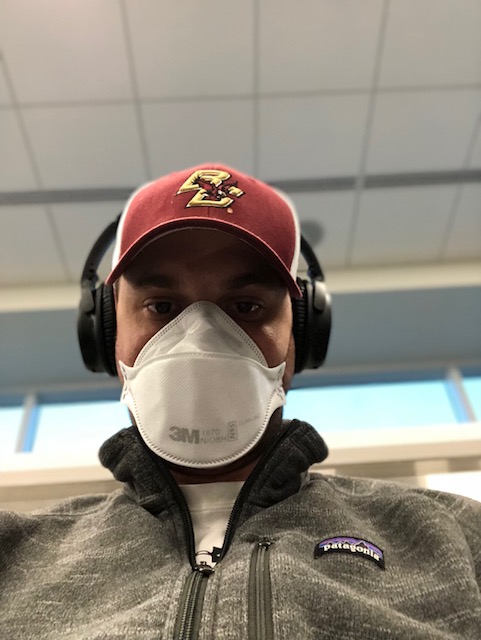Last week I had started writing a blog post….
One of the unforeseen affects of taking Trikafta has been my liberation from my cystic fibrosis clinic(s). I was at a point in my life where I was going to the clinic every other month to tackle some new challenge. Sometimes I was there as frequently as every month, too.
I had made it about four months since my last CF clinic visit but then I got hit with some terrible virus (No… it wasn’t coronavirus). I had a fever I couldn’t break for almost four days. In fact, I ended up having to go into the clinic to get a flu swab. It was negative (thank God and thank you flu shot!). Darcy ended up with the virus, too. Needless to say, it was a pretty shitty week last week.
For those of you keeping score at home… This was my THIRD damn cold of the school year. The good news, I am already back to baseline. Thank you, Trikafta.
In the middle of it all, I had this realization that since switching to brand Trikafta, after the trial, my (almost) liberation from seemingly incessant CF clinic visits was… well… liberating.
That’s not to say, though, that there’s something reassuring about going to the clinic so often. The folks at my clinic back in New York became a constant in my life, and I think it’s how I really got to know my team so well. Rarely was there a sense of panic when I was in there despite my declining health. Action plans were always developed and retooled. Sometimes those plans broke down, only to be replaced by another plan of action, and other times they were cultivated with consultation with other parts of the hospital – infectious disease, for example.
The routine of each visit was simply that, a routine.
In fact, in an audio book I listened to over Thanksgiving break (how else am I supposed to kill the 5 hour drive to and from Hanover) entitled “Alchemy” by Rory Sutherland discussed the nature of the global healthcare system for people dealing with chronic illness and the elderly. He breaks hospital visits into two buckets – treatment and reassurance. You can argue where routine visits fall, but I think he makes a good point. Whenever I find myself in the clinic I am either there to treat a new issue or get reassured that things are going in the right direction. Sutherland argues that the reassurance visits are putting a costly drain on the health system, but for people who deal with isolation from old age, or (and if you’ll allow me to expand on his line of thinking) isolation from advanced illness, recurrent trips to the medical center fulfill social needs and human to human interaction.
Sutherland is English, so healthcare rationing is a reality overseas, but I think it’s worth discussing.
Frankly, I think Sutherland is exactly right.
Now that the recurrent clinic routine has now been absent from my life for a while, I feel as through I am paving a new way through my health journey. Prior to this wacky illness, I hadn’t stepped foot inside a CF clinic since the end of October, and I’m not due to go back until the end of February – it will be about 4 months or so in total between visits.
The step back from constant CF care allows me to feel like I am taking a step forward with the rest of my life.
That’s not to say I haven’t been in touch with one or both of my clinics (remember, I am managing care through Dartmouth, while Columbia remains my home clinic), because I certainly have.
I have dealt with a back to school cold, so I have had to play an active role in my care through the encrypted communication network we have up here at Dartmouth. Fortunately Trikafta allows me to maintain my respiratory health when a new virus passes through my body, so rushing to the clinic isn’t necessary like it used to be.
If I stay in the treatment vs. reassurance buckets, I feel like I am moving from treatment into reassurance with my clinic visits these days. But what if these reassurance visits really are a drain on the health system? I sort of see the point. They clog waiting rooms, drive up recurrent costs, sometimes call for unnecessary testing and put patients in harms way as hospital-acquired infections continue to rise. At the same time, going to the clinic is ABSOLUTELY necessary whether you’re healthy or not. Periodic check-ins simply cannot go away, but what if we can change what they look like. Would a telehealth model cut down on the inconvience (and maybe cost) of regular hospital visits? What would that do to the hospital industry, though? Does telehealth imperil the working life for different hospital or medical center staffers?
The hospital system is big business – it’s a multi trillion-dollar business – and it’s growing. Does telehealth serve as a potential disruptor, and if it does, does that mean patients will suffer from a slower service rollout?
Anyway… I think I have strayed too far from the point of this post. Just a few questions to think about as your start off your day! I hope as more and more people start Trikafta, they can spend less time in the clinic and more time enjoying their lives, because life, after all, is about living!
PS…. I absolutely love my care teams at Columbia and Dartmouth… I really do miss seeing them so often, but such is the paradox of healthcare. The better we feel, the less we see of the people who help make sure we feel so great!





